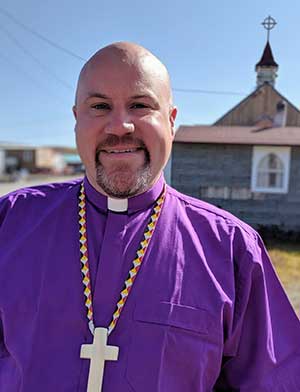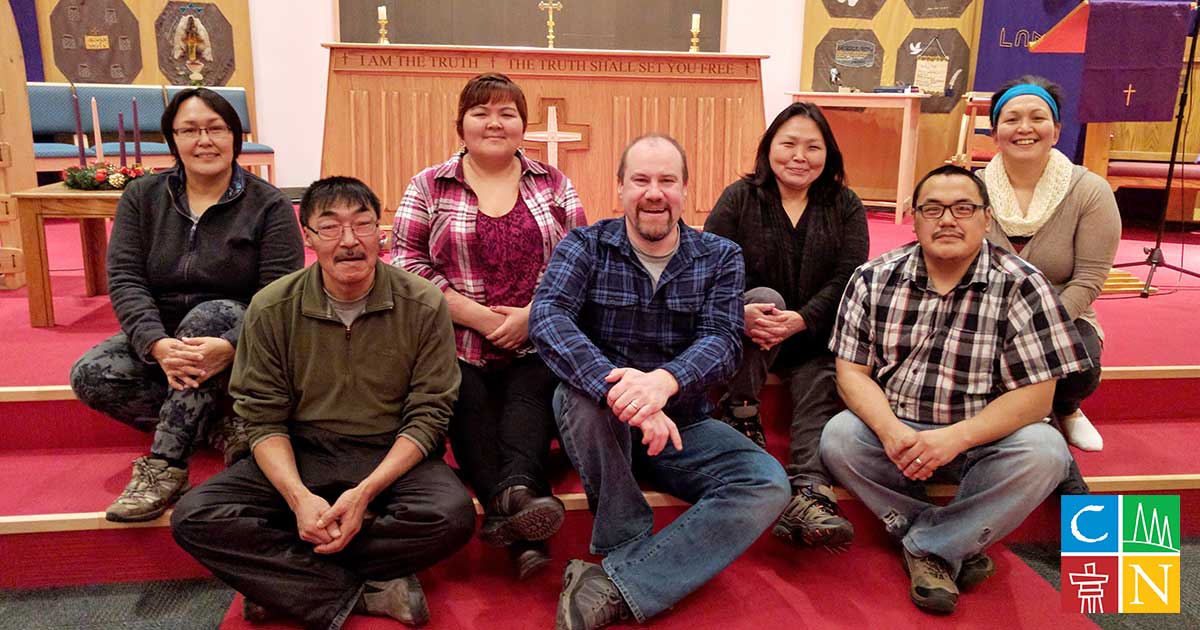from the Advent 2020 edition of Contact
A conversation with Bishop Joey Royal of the diocese of the Arctic
By Matt Gardner for Contact
Joey Royal was elected as a suffragan bishop for the diocese of the Arctic on March 28, 2019 and consecrated three days later. He lives in Iqaluit, Nunavut, where he has also served as director and primary instructor at the Arthur Turner Training School since 2016.
A graduate of Providence University College and Theological Seminary in Manitoba, Royal previously served as the rector at Holy Trinity Anglican Church in Yellowknife before relocating to Nunavut. He is a regular contributor to Covenant, the blog of the Living Church Foundation.
Contact spoke with Bishop Royal on Oct. 5, 2020, to learn about new developments in the diocese and upcoming plans. This interview has been edited for brevity.
Q. How are you handling episcopal ministry in the time of COVID-19?
A. Well, it’s strange. I think a lot of people are finding the shakeup that it has brought is strange, and it’s unprecedented, and it’s uncertain. But at a deeper level, I think the call from our Lord hasn’t changed. Jesus still calls us to follow him and to live a life of the Spirit, and, as we can, to be the church. I think the challenge is at the institutional level—how to still gather and keep people safe and how to administrate the diocese in a challenging time.
Some churches are starting to reopen now, but they’re following strict guidelines. It may seem a little over-the-top given we have no cases. The reason we have no cases is because there’s been such a lockdown. People are wearing masks and we’re following government guidelines on capacity, and we’re not doing the Eucharist and we’re keeping tabs on who’s coming in and out and all that. Administratively, it’s quite a shakeup, it definitely is. There’s no question.
Q. What are your current priorities in the diocese of the Arctic?
A. They’re the same, really. They haven’t changed in terms of our basic mission, which is to proclaim Jesus Christ, to make him known. That’s been what we’re doing all the time. Honestly, people use Facebook and each community has a local radio station. Ministry has happened on the radio for years, or online. What has changed is the limitation on gathering together, which is tough. It’s especially tough, I would say, with funerals and so on. But our mission’s the same.
Where it’s difficult is internet is weak in certain communities, phone can be not great, and so the remoteness can mean certain challenges. But they’re challenges that are not new. Trying to communicate across vast distances and cross-culturally and with different languages, these are not new challenges in the church. They’ve been there since Day 1.
In a sense, we’re in a new situation. In another sense, it seems new because I think we often operate with a very limited sense of history. But the church has lived through pandemics. The church has lived through challenges of various kinds, even more severe challenges than we have now. Although it feels unique to us, and it is in some ways, the church has faced challenges like this and has overcome greater ones than these by the power of God—by the power of God, always.

Q. Have you noticed more people coming out to online worship services than previously attended in-person worship?
A. What I’ve heard a lot from different priests and lay leaders is especially with online ministry, they’re seeing people that have either had no involvement in the church or else had kind of drifted away. They’re seeing people come back.
I’ve heard that also from other bishops across the church. That’s a really interesting thing and quite noteworthy, and I think we’ll be thinking about this for a long time. There are causes for celebration and reasons for encouragement in all this, and I think reaching new people is a good thing.
Q. How are things going at Arthur Turner Training School?
A. Good. We’ve got three students now. The reason there’s less than last [year] is not because less people applied, it’s because we still struggle to secure housing. But we have three, and because it’s a small enough [group], we can do so with proper social distancing measures and all that.
It’s going well. I’m really encouraged, and I’m really encouraged by what the graduates in the last class have done. One of the students is now down at Wycliffe College in Toronto. The others are doing really great ministry across the Arctic and are ordained.
The three now I think will be a wonderful addition to the diocese. All the students are Inuit who are bilingual. They all speak English and Inuktitut, and it’s been wonderful just to see them go out and make the impacts they’re making.
Q. Anything else you’d like Anglicans to know about the diocese of Arctic?
A. Even though we are geographically remote, all who claim the name of Christ are one, so I just want the people in the south to be assured of my prayers. I would value their prayers as well, and I do hope that whatever comes out of this that we will be drawn into deeper union with our Lord and also deeper unity with one another in the name of Christ.
I think the question is, what is God doing through this? That’s always, I think, the question to ask. What is God doing in and through this?
Interested in keeping up-to-date on news, opinion, events and resources from the Anglican Church of Canada? Sign up for our email alerts .

